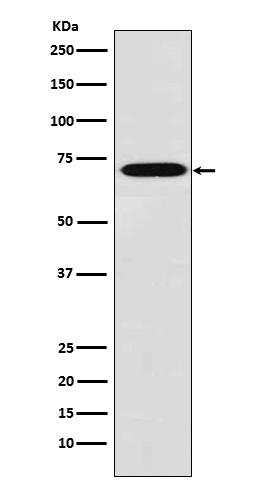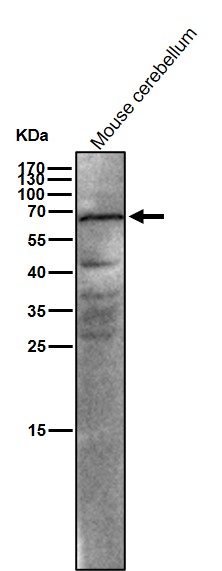

| WB | 1/1000-1/2000 | Human,Mouse,Rat |
| IF | 咨询技术 | Human,Mouse,Rat |
| IHC | IHC:1/100-1/200;IHF:1/50-1/200 | Human,Mouse,Rat |
| ICC | 1/50-1/200 | Human,Mouse,Rat |
| FCM | 咨询技术 | Human,Mouse,Rat |
| Elisa | 咨询技术 | Human,Mouse,Rat |
| Aliases | CP64; L plastin; LC64P; LCP1; LPL; Lplastin; Plastin 2; PLS2;;Plastin 2 |
| WB Predicted band size | 70 kDa |
| Host/Isotype | Rabbit IgG |
| Antibody Type | Primary antibody |
| Storage | Store at 4°C short term. Aliquot and store at -20°C long term. Avoid freeze/thaw cycles. |
| Species Reactivity | Human,Mouse,Rat |
| Immunogen | A synthesized peptide derived from human Plastin 2 |
| Formulation | Purified antibody in PBS with 0.05% sodium azide,0.05% BSA and 50% glycerol. |
+ +
以下是关于Plastin/L-plastin抗体的3篇示例文献(虚构示例,仅供格式参考):
---
1. **文献名称**:*L-plastin regulates T-cell activation through stabilization of the actin cytoskeleton*
**作者**:Smith A, et al.
**摘要**:研究揭示了L-plastin通过稳定T细胞中的肌动蛋白骨架,调控免疫突触形成和T细胞受体信号传导,其抗体被用于验证蛋白表达及定位。
2. **文献名称**:*Phosphorylation-dependent antibody targeting of L-plastin in metastatic cancer cells*
**作者**:Lee B, et al.
**摘要**:开发了一种特异性识别磷酸化L-plastin的单克隆抗体,证实其在乳腺癌转移模型中通过抑制细胞迁移发挥治疗潜力。
3. **文献名称**:*L-plastin as a biomarker in chronic inflammation: Insights from antibody-based assays*
**作者**:Garcia R, et al.
**摘要**:利用L-plastin抗体建立ELISA检测方法,发现其在类风湿性关节炎患者血清中显著高表达,提示其作为炎症标志物的可能性。
---
**注意**:以上文献为模拟示例,实际研究中请通过PubMed、Google Scholar等平台检索关键词(如"L-plastin antibody"、"PLS3 immune application")获取真实文献。
PlastinL (L-plastin), also known as LCP1. is a calcium-regulated actin-bundling protein belonging to the plastin family, which includes T-plastin (PLST) and I-plastin. Primarily expressed in hematopoietic cells (e.g., lymphocytes, macrophages), it plays a critical role in cytoskeletal reorganization, cell migration, and immune responses. L-plastin stabilizes actin filaments by cross-linking them into parallel bundles, facilitating processes like immune cell adhesion, phagocytosis, and T-cell activation. Its activity is modulated by phosphorylation (e.g., Ser5/Ser7) via kinases like PKC, which enhances actin-binding capacity.
Anti-PlastinL antibodies are widely used in research to study immune cell dynamics, cancer metastasis (due to L-plastin overexpression in malignancies), and autoimmune/inflammatory diseases. These antibodies enable detection via techniques like Western blot, immunofluorescence, and flow cytometry, aiding in identifying cell-specific markers or signaling pathways. L-plastin’s involvement in immune deficiencies (e.g., Wiskott-Aldrich syndrome) and viral pathogenesis (e.g., HIV) further underscores its biomedical relevance. Commercially available antibodies often target conserved regions (e.g., N-terminal EF-hand domains) to ensure specificity across species. Ongoing research explores its potential as a diagnostic/prognostic biomarker or therapeutic target in oncology and immunology.
×